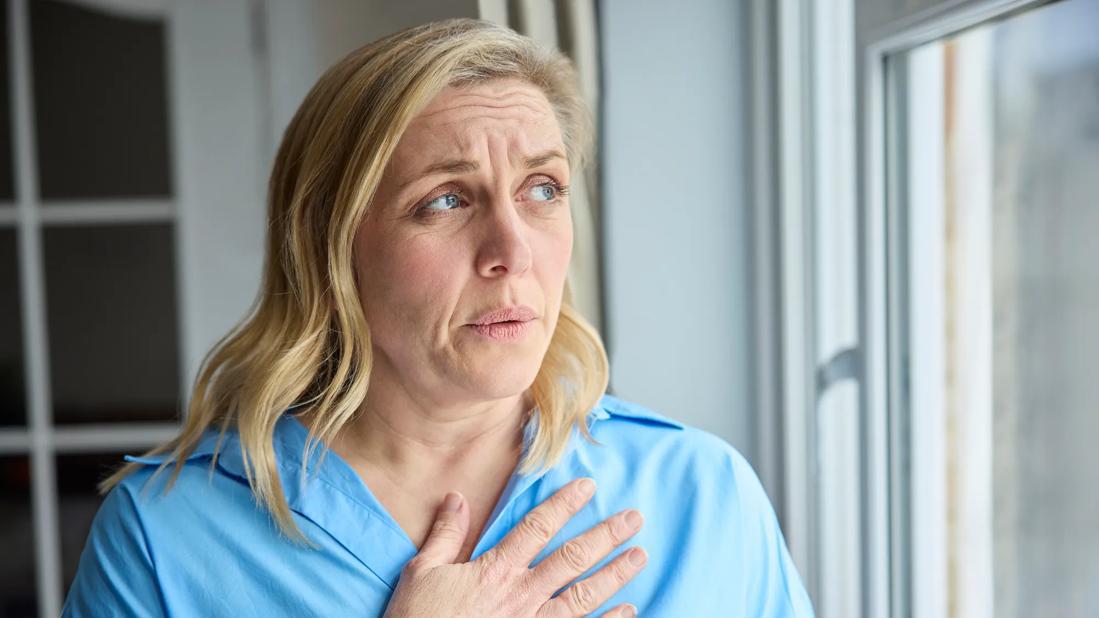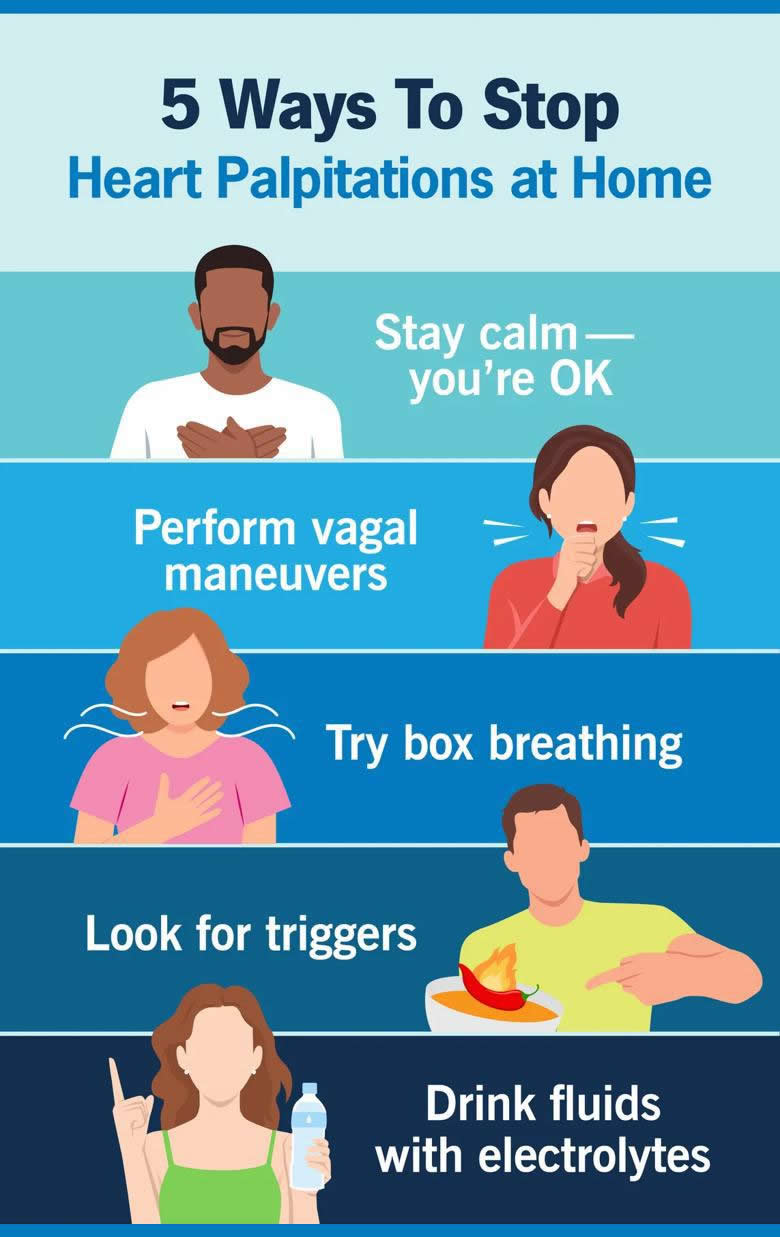How To Stop Your Heart Palpitations at Home
If you don’t have other symptoms, try using relaxation techniques and vagal maneuvers to calm your heart down

Most heart palpitations are short-lived, don’t come with other symptoms and can be managed at home.
“If you feel a change in your heartbeat but it doesn’t worry you, it’s OK to try stopping them at home yourself,” says cardiologist Tamanna Singh, MD.
Dr. Singh shares five tried-and-true techniques to get your heart back on beat.
5 steps to stop palpitations fast
If you want to ease heart palpitations, you need to calm your body and give your heart a chance to catch up.
Many of the most common triggers for palpitations (like caffeine, stress and nicotine) activate your body’s “fight-or-flight” response, also known as your sympathetic nervous system. Basically, your body’s gearing up to defend you against a perceived threat.
You can often reduce heart palpitations by downshifting into a cozy, “rest-and-digest” response. To do that, you need to activate your parasympathetic nervous system.
Here’s how:

1. Calmly assess your situation
“Don’t panic” probably sounds dismissive — but, in this case, it’s also sound medical advice. Feeling anxious about your heartbeat can make palpitations worse. So, let’s say it again: Oftentimes, heart palpitations are nothing to worry about.
“When we fret and stress, we speed up our heart rate and push our body into that ‘fight-or-flight’ response,” Dr. Singh reiterates. “If you’re having palpitations and you tense up — if you let your mind race or focus on the fear — it’s probably going to make the palpitations worse.”
So, take a beat. Then, calmly ask yourself:
- Am I having any other symptoms?
- Is what I’m feeling familiar? If it’s different, how is it different?
- Is something I’m doing or feeling right now causing these palpitations?
If you’re experiencing other symptoms or feel like your heart palpitations aren’t normal, call a provider. Otherwise, try the following methods to reduce them.
2. Take some deep breaths
Spending a few minutes practicing deep breathing is one of the best ways to calm your mind and, in turn, stop your heart palpitations.
“When we fill up our body with oxygen, it lets our system know that we’re OK. There’s no danger here and we don’t need to be on guard,” Dr. Singh explains.
She suggests the box breathing technique, also called 4x4 breathing. To do it:
- Inhale as you count slowly to four.
- Hold your breath for a count of four.
- Exhale as you count slowly to four.
- Hold your breath for another count of four.
- Repeat that pattern a few times, or until your palpitations stop.
You can try for a higher number than four, too, if it feels good. Just be sure to inhale, hold, exhale and hold again for the same amount of time.
If you enjoy this activity, keep it up! Doing breathing exercises for a few minutes at a time several times a day may help prevent anxiety-induced palpitations.
3. Try some vagal maneuvers
Vagal maneuvers are another way to calm your heart and activate your parasympathetic nervous system. These actions stimulate your vagus nerve, which works as your heart’s natural pacemaker. When it’s activated, it slows down and normalizes your heart’s rhythm, stopping your palpitations.
To ease palpitations, try one (or more) of these actions:
- Splash cold water on your face.
- Tense up your muscles and bear down, like you’re trying to poop.
- Form your mouth into an “O” and exhale hard, like you’re trying to blow through a straw.
Depending on your health, your provider may recommend trying vagal maneuvers that are more intense, like putting your face in a bowl of cold water, rather than giving it a splash. Always talk to your provider before trying an extreme vagal maneuver for your heart palpitations.
4. Focus on hydration and electrolytes
Dehydration and electrolyte imbalances often go hand-in-hand — and when they do, they can cause heart palpitations.
If you haven’t been drinking enough fluids, your best bet is rehydrating yourself with electrolyte-rich beverages like sports drinks. You can also buy sugar-free electrolyte powders or tablets that dissolve in water.
Don’t have those options on hand? Drink water. If you can, add a small pinch of salt for an electrolyte boost.
5. Recognize and avoid triggers
If you’re having heart palpitations, ask yourself what (if anything) could be triggering them. Having too much caffeine, nicotine, alcohol (or even spicy food!) can all kick your fight-or-flight mode into high gear and trigger palpitations.
Setting down that cup of coffee or skipping that second helping of extra-spicy chicken vindaloo won’t be an instant fix. But it should eventually calm the palpitations — or at least keep them from getting worse.
Not sure what your triggers are? If you get palpitations often, Dr. Singh suggests keeping a symptom diary. By writing down when they happen and what you’re doing, you may be able to home in on your triggers.
“It’s a great way to keep track of patterns,” she says. “Note the intensity of the feeling, how long they last and so on. That way, you can provide your specialist with a detailed description about what’s going on.”
Final thoughts
It’s important to contact a healthcare provider if you’re getting heart palpitations more often than you used to — or if heart palpitations aren’t your only symptom. These could both indicate an underlying condition.
Call 911 or emergency services immediately if you’re:
- Still having palpitations after trying these techniques
- Getting worse, not better
- Struggling to breathe
- Noticing pain or pressure in your chest, arm, neck, jaw or upper back
- Sweating excessively
- Fainting or feeling like you might faint soon (pre-syncope)
- Tachycardic, meaning your heart’s beating more than 100 times a minute at rest
- Dizzy, lightheaded or disoriented
“Always trust your gut,” Dr. Singh advises. “You can treat occasional, mild palpitations at home. But if you’re worried that something dangerous is happening, call 911.”